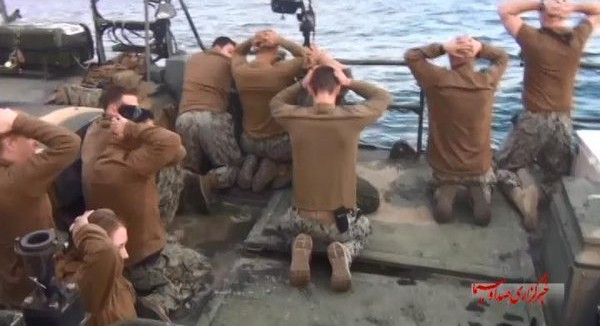Iran has released ten American sailors and two United States Navy boats that they seized Tuesday and held overnight. The country claimed that the U.S. had apologized for entering Iranian waters.
The Navy lost contact with the boats as they traveled between Bahrain, where the U.S. Fifth Fleet is based, and Kuwait. It was later reported that that ten sailors—nine men and one woman—were detained on Farsi Island, in the middle of the Persian Gulf. The island is a base for Iran’s Islamic Revolutionary Guard Corps (IRGC). The sailors were returned to their vessels Wednesday morning to head back to Bahrain.
Secretary of State John Kerry thanked Iran in a statement “for their cooperation in swiftly resolving this matter.”
The Navy will be “determining … how exactly these sailors found themselves in Iran. And that’s something we’re going to be looking at,” Fifth Fleet Spokesman Cmdr. Kevin Stephens told the Associated Press.
A statement on the IRGC website said that the sailors were released “after determining that their entry into Iran’s territorial waters was not intentional and their apology.”
Despite earlier reports that Kerry had apologized to Iran, Vice President Joe Biden told CBS This Morning that no apology had been issued and none had been demanded, attributing the incident to “standard nautical practice.”
However, Fox News reported that Iran’s foreign minister had demanded an apology:
Gen. Ali Fadavi also told state TV Wednesday that the American boats showed “unprofessional acts” for 40 minutes before being picked up by Iranian forces.
“Certainly U.S. presence in Persian Gulf and their passage has never been innocent and we do not deem their passage as innocent,” Fadavi said, adding that Iran Foreign Minister Javad Zarif “had a firm stance (during a telephone conversation with U.S. Secretary of State John Kerry) on their presence in our territorial waters and said they should not have come and should apologize.”
Fox News also reported that Iran had seized the GPS equipment on both boats to “prove that American ships were ‘snooping’ around in Iranian waters.”
The report also raised questions about the official explanation of the incident:
Officials are still uncertain of how Iranian forces managed to commandeer the two boats. The U.S. official told Fox News that a mechanical problem on at least one of the boats could not be ruled out, but could not explain how both boats were able to get underway in such a short time if one did have a propulsion issue, which would have caused it to stop running and drift into Iranian territorial waters.
Iran posted pictures of the detained sailors on the IRGC website. This may be a violation of the Third Geneva Convention, which calls for the protection of prisoners against “against insults and public curiosity.” In 2007, when Iran captured 15 British sailors and marines, the UK government said that broadcasting images of captured sailors was a violation of the Geneva Conventions.
Similarly, the torching of the Saudi embassy in Tehran earlier this month, which the Iranian government was unable or unwilling to stop, was a violation of article 22 of the Vienna Convention on Diplomatic Relations, which states that “the receiving State is under a special duty to take all appropriate steps to protect the premises of the mission against any intrusion or damage and to prevent any disturbance of the peace of mission or impairment of its dignity.”
Last year Iran seized the ship Maersk Tigris, holding it and its crew for ten days until the company agreed to pay a judgment issued by an Iranian court. Legal scholar Eugene Kontorovich wrote in The Washington Post that the seizure “clearly [violated] international law, and one might add, a branch of international law that is ordinarily well-respected, and quite fundamental for global commerce.”
[Photo: Amichei Stein / Twitter]




